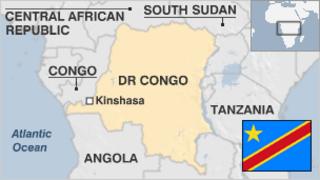DR Congo profile
The recent history of the Democratic Republic of Congo (DR Congo) has been one of civil war and corruption.
DR Congo is a vast country with immense economic resources and, until recently, has been at the centre of what some observers call “Africa’s world war”, with widespread civilian suffering the result.
The war claimed an up to six million lives, either as a direct result of fighting or because of disease and malnutrition.
The war had an economic as well as a political side. Fighting was fuelled by the country’s vast mineral wealth, with all sides taking advantage of the anarchy to plunder natural resources.
Some militias fight on in the east, where a large United Nations force is struggling to keep the peace.
FACTS
Democratic Republic of the Congo
Capital: Kinshasa
Population 81.5 million
Area 2.34 million sq km (905,354 sq miles)
Major languages French, Lingala, Kiswahili, Kikongo, Tshiluba
Major religions Christianity, Islam
Life expectancy 58 years (men), 61 years (women)
Currency Congolese franc
LEADER
President (outgoing): Joseph Kabila
Joseph Kabila became president when his father Laurent was assassinated in 2001. He was elected in 2006, and secured another term in controversial elections in 2011.
He refused to leave office when his term expired in December 2016. Elections, twice delayed, were eventually held in December 2018, but the results have caused controversy. Officials declared opposition candidate Felix Tshisekedi the winner, prompting protests from rival opposition candidate Martin Fayulu of a deal with the government, whose candidate Emmanuel Ramazani Shadary came third.
The Congolese media operate against a backdrop of political power struggles and unrest.
Reporters Without Borders says journalists face arrest, threats and violence.
The press carries criticism of the government, and some publications reflect opposition party views.
Radio is the leading medium. Radio Okapi, partly run by the local UN mission, is an influential outlet.
TIMELINE
Some key dates in DRCongo’s history:
1200s – Rise of Kongo Empire, centred in modern northern Angola and including extreme western Congo and territories round lakes Kisale and Upemba in central Katanga (now Shaba).
16th-17th centuries – British, Dutch, Portuguese and French merchants engage in slave trade through Kongo intermediaries.
1870s – Belgian King Leopold II sets up a private venture to colonise Kongo.
1908 – Congo Free State placed under Belgian rule following outrage over treatment of Congolese.
1960 – Independence, followed by civil war and temporary fragmentation of country.
1965 – Mobutu Sese Seko seizes power.
1997 – Rebels oust Mobutu. Laurent Kabila becomes president.
1997-2003 – Civil war, drawing in several neighbouring countries. Dozens of armed groups fight on in the east, requiring a large United Nations military force to try to maintain order.
2006 – First free elections in four decades. Joseph Kabila wins the run-off vote.
2016 – President Kabila remains in power in violation of the constitution.
2019 – Officials declare opposition candidate Felix Tshisekedi the winner of December’s presidential election.
Read full timeline
Source: Read Full Article



